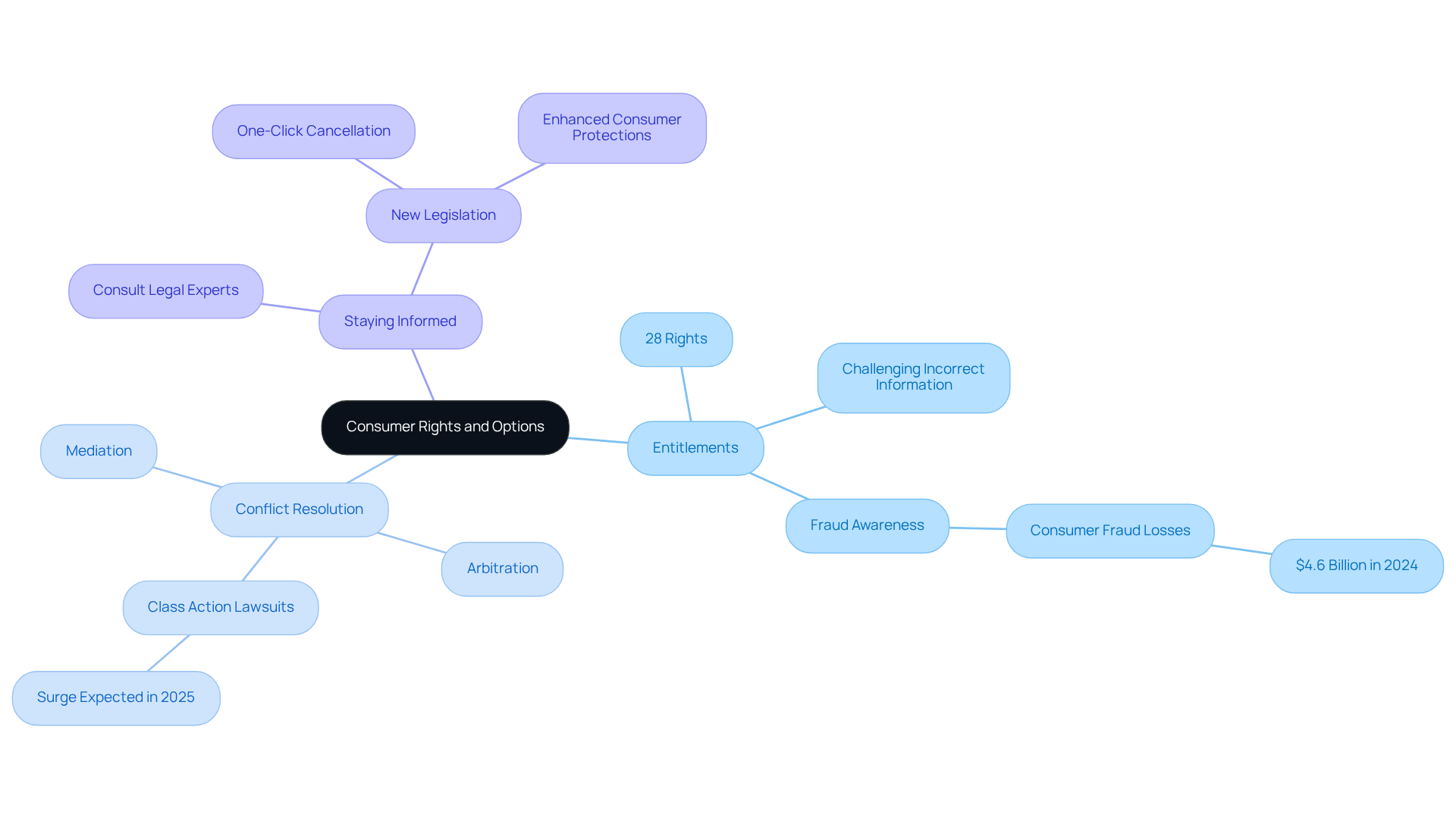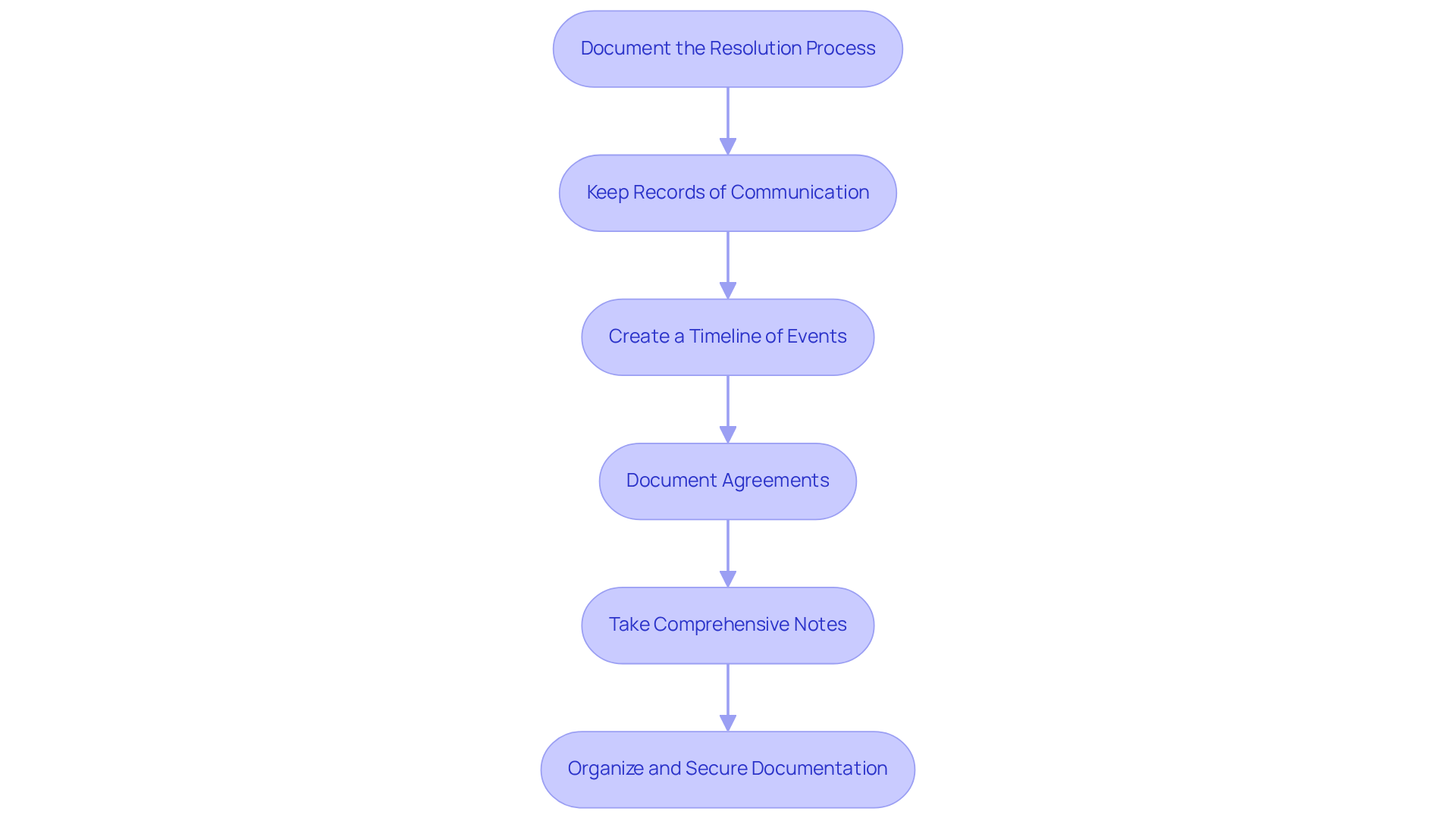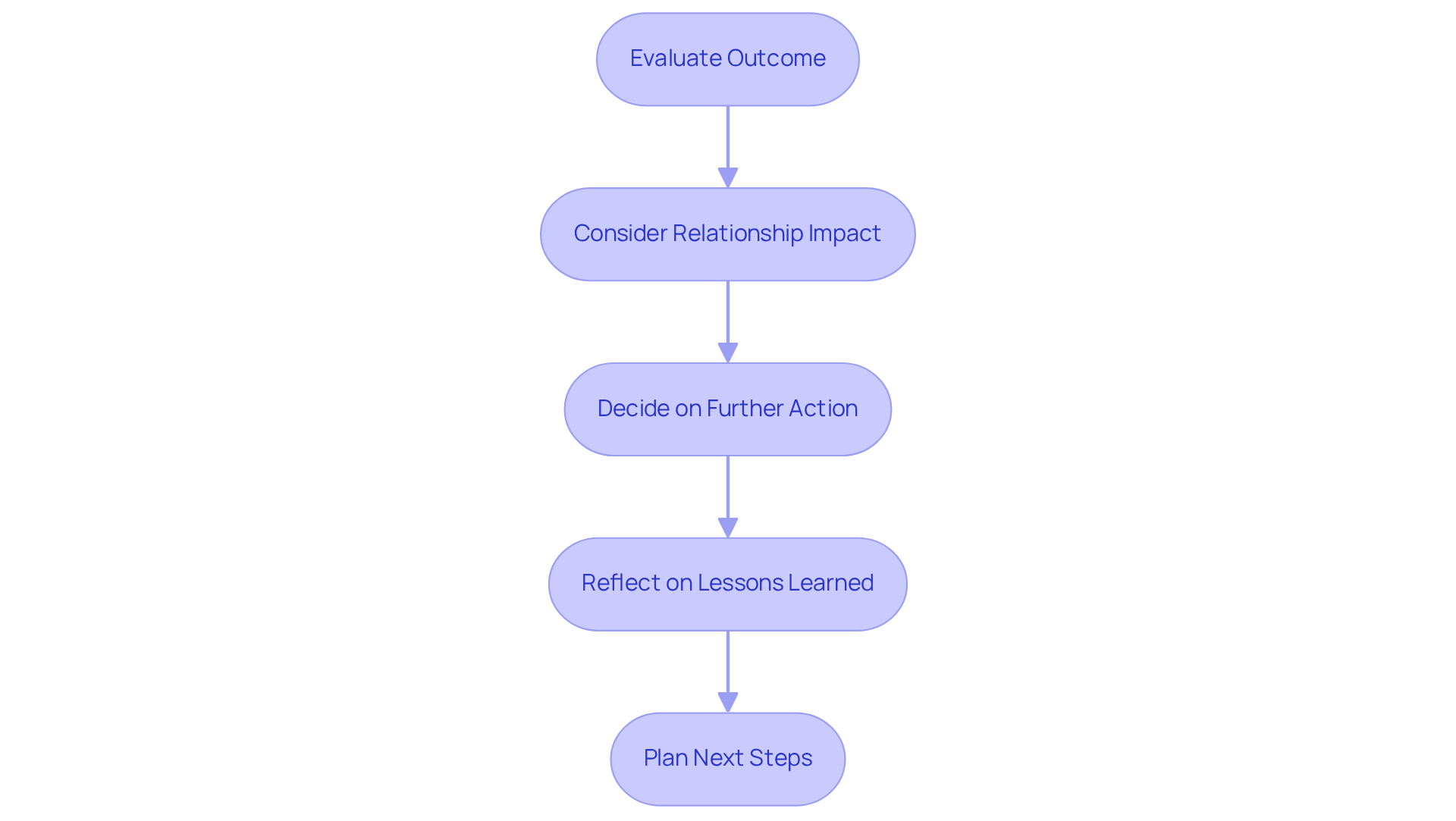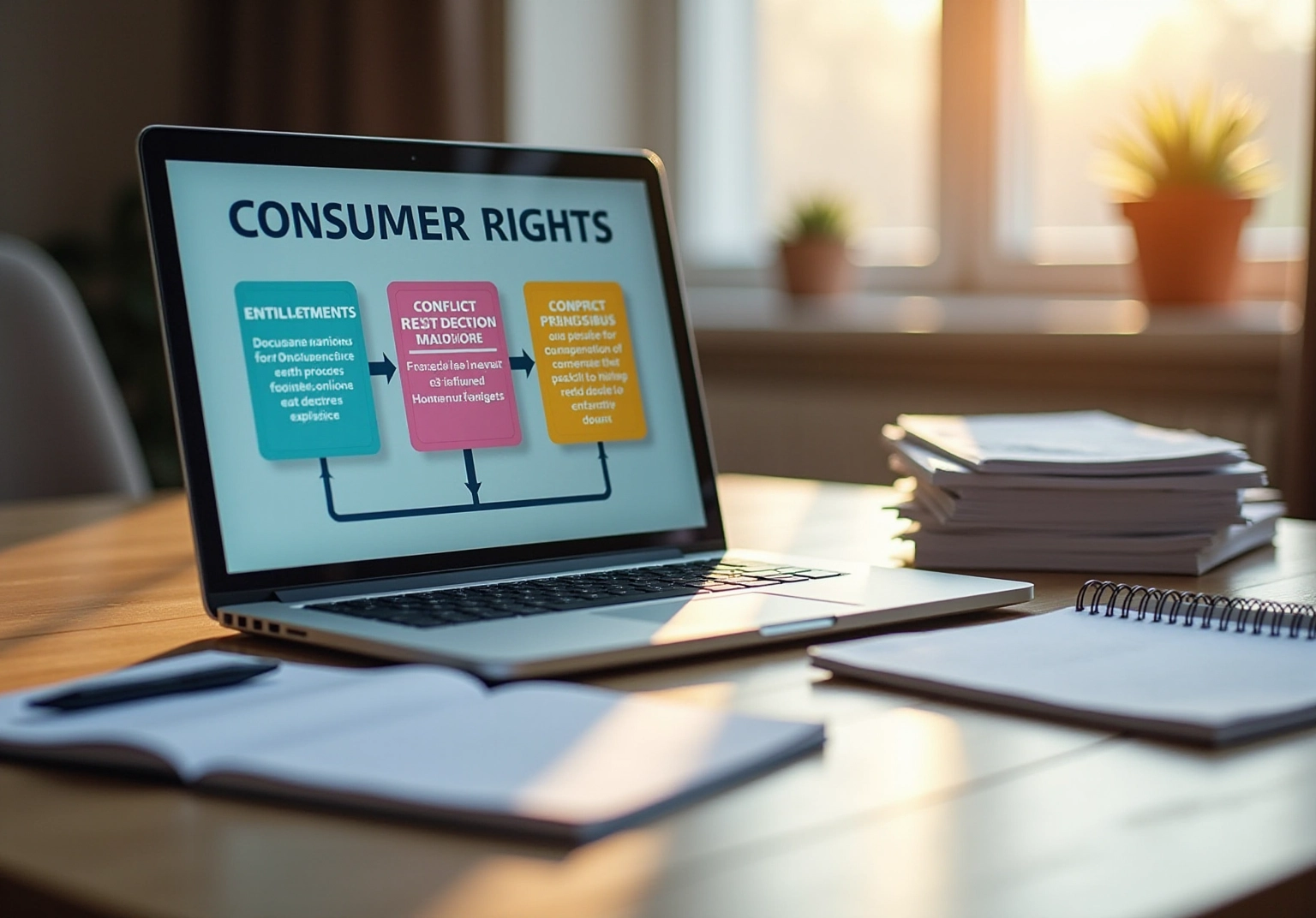
3 Steps for Managing Consumer Disputes After Resolution
Overview
Navigating consumer disputes can be challenging. It’s essential to understand your rights and options. By being informed about consumer protection laws, you can feel empowered to take the necessary steps.
Documenting the resolution process is crucial. Keeping thorough records not only aids in effective resolution but also provides peace of mind. Reflecting on the outcome allows you to evaluate what worked and what didn’t, guiding your future actions.
This process isn’t just about resolving a dispute; it’s about learning and growing from the experience. How can you use this knowledge to navigate future challenges? Remember, you’re not alone in this journey. Together, we can work towards a more informed and empowered approach to consumer rights.
Introduction
Navigating consumer disputes can often feel overwhelming, like walking through a minefield. Misunderstandings and miscommunications may lead to frustration and lost resources. It's essential to understand your rights and options in this landscape, especially as consumer protection laws change and new paths for resolution become available.
How can you ensure that you’re prepared to handle disputes effectively after a resolution has been reached? This article explores three vital steps that empower you to manage disputes post-resolution. We’ll highlight the importance of documentation, evaluation, and strategic planning to protect your rights and improve future interactions. Together, we can navigate these challenges with confidence.
Understand Your Rights and Options
Acquaint yourself with the protection regulations that pertain to your circumstances. These laws are designed to secure your entitlements, and understanding them can be empowering. For instance, the National Consumer Law Center highlights that individuals have 28 entitlements to seek information regarding their conflicts. This knowledge is crucial for grasping your position in any disagreement.
It's important to comprehend your specific entitlements as a buyer. This includes the ability to challenge incorrect information, especially given the alarming rise in consumer fraud cases, which reported losses of approximately $4.6 billion in 2024. Such statistics underscore the significance of being aware of your rights to effectively manage conflicts.
Have you explored the various conflict resolution options available to you? Methods like mediation and arbitration can offer quicker and more cost-effective solutions than traditional legal routes. With class action lawsuits expected to surge in 2025—particularly concerning AI bias and data privacy violations—knowing your options and being prepared for potential disputes is more important than ever.
If you find yourself feeling uncertain, consider consulting with a legal expert. They can clarify your entitlements and guide you on the best course of action. Legal experts offer valuable insights into the evolving landscape of buyer entitlements, especially with new legislation set to strengthen protections in 2025. This includes rules mandating one-click cancellation for online subscriptions, aimed at enhancing user experiences.
Stay informed about any changes in consumer protection laws that may impact your rights and options. By keeping updated on these advancements, you empower yourself to make informed choices in managing conflicts.

Document the Resolution Process
-
Keeping records of all communication related to the conflict, including emails, letters, and notes from phone calls, is essential. These serve as vital proof in any settlement process. As Roenan Patt emphasizes, recording conflicts is crucial for effective resolution. Have you considered how these records can support you?
-
Creating a detailed timeline of events is another important step. Documenting the dates of communications and actions taken clarifies the sequence of events and strengthens your position if further action is necessary. In 2025, 15% of customer claimant cases were closed, highlighting the importance of thorough documentation in achieving closure.
-
It’s also vital to ensure that any agreements reached during the resolution process are documented. All parties should sign copies to confirm their acceptance. This practice preserves your legal rights and helps prevent future misunderstandings. How reassuring would it be to have everything clearly outlined?
-
Taking comprehensive notes during meetings or discussions can be incredibly helpful. Capturing key points and commitments not only aids your memory but also serves as a reference for future interactions. Have you ever found yourself wishing you had noted something important?
-
Finally, organizing and securely storing all documentation is crucial for easy access in the future. A well-maintained record-keeping system significantly enhances your ability to manage consumer disputes after resolution effectively and proves invaluable in legal contexts. Remember, ADR offers flexible scheduling options and a streamlined booking process, making it easier for you to access these essential services.

Evaluate the Outcome and Next Steps
Evaluate whether the solution has effectively resolved your consumer disputes after resolution. Think about how mediation might help foster better communication and relationships, while arbitration could offer a more definitive outcome. Which approach feels right for your situation?
Consider how the decision impacts your relationship with the other party. Effective conflict resolution can lead to enhanced interactions and trust, which are essential for maintaining ongoing relationships and minimizing consumer disputes after resolution. How might this change your dynamics moving forward?
Is further action necessary for you? Perhaps filing a complaint with a regulatory body or seeking additional mediation could be beneficial. According to the 2023 Consumer Conditions Scoreboard, 25% of consumers face issues worth complaining about, yet one-third do not take action. It’s important to be proactive in addressing your concerns.
Reflect on the process to uncover valuable lessons for future conflicts. Understanding what worked and what didn’t can significantly enhance your approach to conflict resolution moving forward. What insights have you gained?
Plan your next steps based on your evaluation. Whether you decide to pursue further action or choose to move on, strategic planning is essential for effectively managing consumer disputes after resolution and ensuring your rights are upheld. What will your next move be?

Conclusion
Understanding and managing consumer disputes effectively is not just a necessity; it’s a way to safeguard your rights and ensure satisfactory outcomes. By familiarizing yourself with applicable laws, carefully documenting the resolution process, and thoughtfully evaluating outcomes, you can navigate conflicts with confidence and clarity.
Have you considered how knowing your consumer rights can empower you? Options like mediation and arbitration can lead to quicker resolutions, alleviating some of the stress that often accompanies disputes. Remember, thorough documentation is vital; it serves as crucial evidence in any conflict. Furthermore, reflecting on the resolution process allows you to learn from your experiences and make informed decisions moving forward.
Ultimately, engaging proactively in understanding and managing disputes not only empowers you but also fosters healthier relationships with service providers. By taking these steps, you enhance your ability to resolve conflicts effectively and ensure your rights are upheld. Together, we can pave the way for a more informed and assertive consumer landscape. Are you ready to take that step towards empowerment?
Frequently Asked Questions
What are my rights as a consumer?
As a consumer, you have entitlements that include the ability to seek information regarding conflicts, as highlighted by the National Consumer Law Center, which indicates you have 28 specific rights in this regard.
Why is it important to understand my consumer rights?
Understanding your consumer rights is crucial for effectively managing conflicts, especially in light of rising consumer fraud cases, which reported losses of approximately $4.6 billion in 2024.
What conflict resolution options are available to consumers?
Consumers can explore various conflict resolution options such as mediation and arbitration, which can provide quicker and more cost-effective solutions compared to traditional legal routes.
What trends are expected in class action lawsuits?
Class action lawsuits are expected to surge in 2025, particularly concerning issues like AI bias and data privacy violations, highlighting the importance of knowing your options for potential disputes.
Should I consult a legal expert regarding my consumer rights?
Yes, consulting a legal expert can help clarify your entitlements and guide you on the best course of action, especially with new legislation set to enhance consumer protections in 2025.
What new consumer protection laws are being introduced in 2025?
New legislation in 2025 is expected to strengthen protections for consumers, including rules that mandate one-click cancellation for online subscriptions to improve user experiences.
How can I stay informed about changes in consumer protection laws?
Staying informed about changes in consumer protection laws involves keeping updated on advancements that may impact your rights and options, empowering you to make informed choices in managing conflicts.


